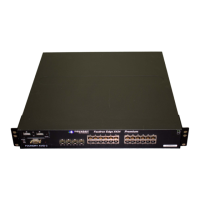Foundry Configuration Guide for the FESX, FSX, and FWSX
A - 8 © Foundry Networks, Inc. December 2005
For example, to disable logging of debugging and informational messages, enter the following commands:
FESX424 Router(config)# no logging buffered debugging
FESX424 Router(config)# no logging buffered informational
Syntax: [no] logging buffered <level> | <num-entries>
The <level> parameter can have one of the following values:
•alerts
• critical
• debugging
• emergencies
• errors
• informational
• notifications
• warnings
The commands in the example above change the log level to notification messages or higher. The software will
not log informational or debugging messages. The changed message level also applies to the Syslog servers.
Changing the Number of Entries the Local Buffer Can Hold
You also can use the logging buffered command to change the number of entries the local Syslog buffer can
store. For example:
FESX424 Router(config)# logging buffered 100
The default number of messages is 50. The value can be from 1 – 1000 on Layer 2 Switches and Layer 3
Switches. The change takes effect immediately and does not require you to reload the software.
NOTE: If you decrease the size of the buffer, the software clears the buffer before placing the change into effect.
If you increase the size of the buffer, the software does not clear existing entries.
Changing the Log Facility
The Syslog daemon on the Syslog server uses a facility to determine where to log the messages from the Foundry
device. The default facility for messages the Foundry device sends to the Syslog server is “user”. You can
change the facility using the following command.
NOTE: You can specify only one facility. If you configure the Foundry device to use two Syslog servers, the
device uses the same facility on both servers.
FESX424 Router(config)# logging facility local0
Syntax: logging facility <facility-name>
The <facility-name> can be one of the following:
• kern – kernel messages
• user – random user-level messages
• mail – mail system
• daemon – system daemons
• auth – security/authorization messages
• syslog – messages generated internally by Syslog

